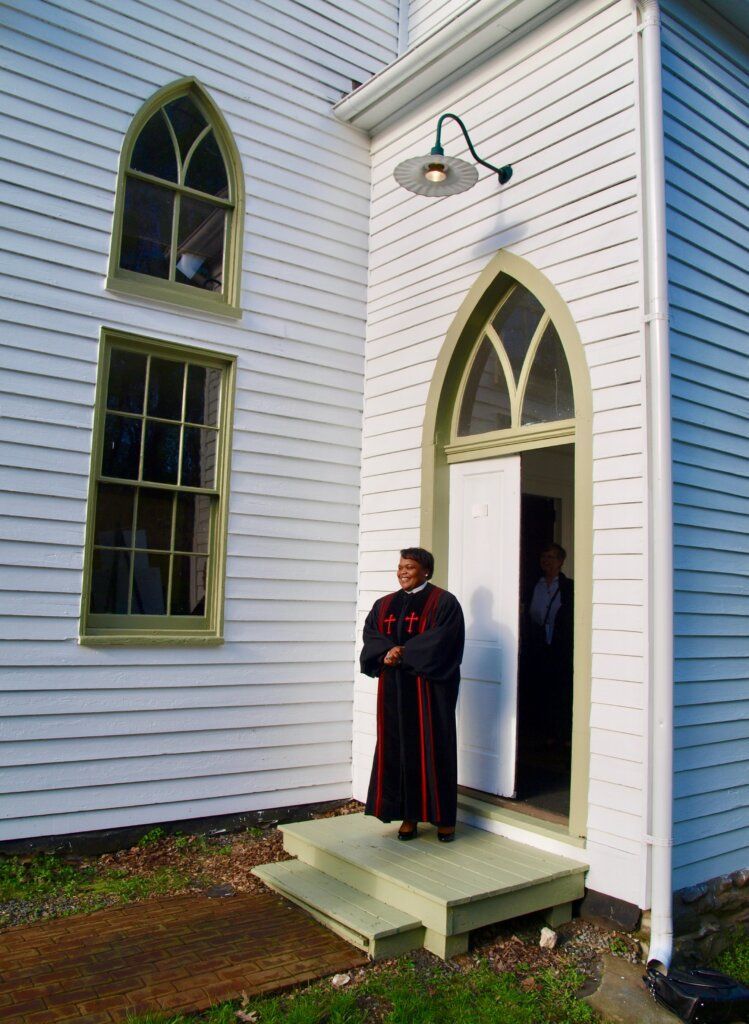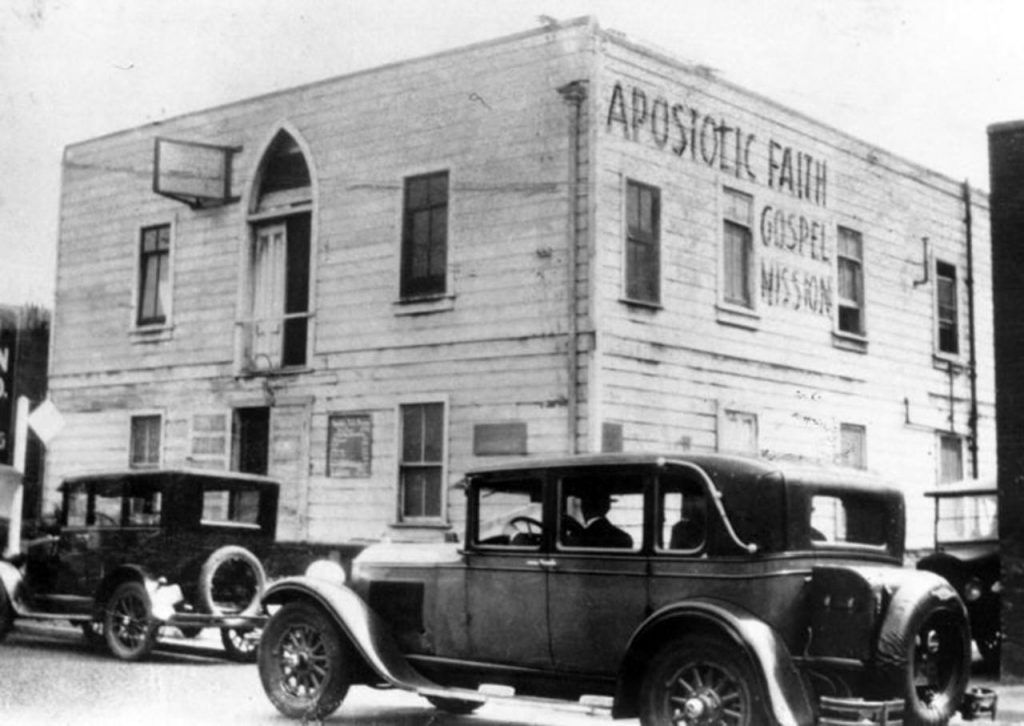Fresh Expressions in the Anglican Stream
Editor’s Note
The Fresh Expressions movement is a Holy Spirit-led approach to cultivating new Christian communities. Inspired by the church of the Apostolic era, it is not limited to any one denomination or tradition, but is “ecclesially flexible.” In this series, Fresh Expressions and the Historical Streams of the Church, readers will hear from Fresh Expressions team members and missional leaders from different streams of the church who will share how this mission model brings out the best of their history, theology, and charism, and how it can bring new life to local congregations.
The image above features three bishops from the Diocese of the Arctic, originally published here. (the author, Jon Davis has led three teaching missions to the Diocese of the Arctic in recent years)
The Anglican tradition is rich, liturgical, sacramental, biblical, theological, experiential, ancient, and missional. The term “Anglican” may bring to mind formal, “high church” liturgies with incense and precise movements reflecting a deep reverence for Almighty God, but it can also be demonstrated in fiery evangelical preaching or in Pentecostal manifestations of the Spirit. There continues to be a struggle in the Worldwide Anglican Communion between progressive, more liberal theological views and conservative, traditional views. But this breadth of expression also makes space for contextually focused, imminently flexible “fresh” approaches to being and doing church, anytime and anywhere.
When you understand the history and the heart of the Anglican Church, it is no wonder that an international, multi-denominational missional movement like Fresh Expressions found its start in England.
Ancient Roots
While it is easy to associate the Church of England with the once-sprawling British Empire, it dates back to the mid-second century and has Celtic roots as well as influence from the church in Rome. There were English Bishops at the Council of Nicea in 325, and in 597, Pope Gregory sent Augustine (of Canterbury) on a mission to evangelize the Anglo-Saxons, bringing the church in England under the auspices of Rome.
In 1534, the Church of England severed ties with the Pope and Rome as a part of the Reformation that was taking place on the continent. The common narrative is that this break took place because King Henry VIII wanted a divorce and the Pope would not allow it. This is true; Henry wanted an heir to the throne that Catherine could not provide. But this is only one aspect bringing about the divide. There were political reasons; the King of Spain pretty much had control over the papacy, and his sister was Henry’s wife, so in essence, Spain was controlling England through the church. There were financial reasons; the Crown was broke, with empty coffers, and by taking control of the church, Henry gained financial assets.
Finally, and most importantly, there was a theological reformation taking place among the clergy as they were reading Martin Luther and others, and they were seeing errors and heresies in the Roman church.
A Passion for the Common Man
At the core, a feature of the English Reformation was the principle of taking the Bible and the worship of the church and translating it into the language of the people. Much of the population was illiterate, but translation meant they could hear and understand the words being spoken, the prayers being prayed, the songs being sung.
This uniquely English focus on accessibility began more than a century earlier when John Wycliffe (often referred to as the “Morning Star of the Reformation”) translated the Scriptures into English. Scholar, theologian, and Bible translator William Tyndale in the 1500s was passionate about the Bible and wanted the common man to have access to the Scriptures. His vision was for a biblically literate English people.
It is estimated that 90% of the King James Version of the New Testament was taken from Tyndale’s translation. Tyndale once quipped in a conversation with a Roman Catholic priest that, “He would cause a boy that drives the plough to know more of the Scripture than the priest did.” This was an essential aspect of the Reformation that unfolded in Britain.
Making Prayer and Worship Accessible
Add to this Archbishop of Canterbury, Thomas Cranmer’s work in compiling and writing much of the Book of Common Prayer for worship in the Church of England, makes this a foundational tenet in the mid-1500s. This mission of getting common people to hear, read, learn, and inwardly digest the Word of God in the context of worship is a central premise, a tactic in securing a biblical faith and practice among the English people.
This task of translation is essential for the 21st Century Church. We need to take the message and experience of Christianity, the essential propositions of the faith once received, and the call to follow Christ and frame them in a manner that people can understand the Good News of God found in Jesus.
Christianity is like a foreign language to most people; it is hard to comprehend, and thus it is hard to value. Like in the English Reformation, there is a need to translate the Christian Faith into the modern world in such a compelling way that unchurched people can understand and believe the Gospel. Translation of the Bible, liturgies, and Christian teachings is an example of contextualization and has been central to the methodology of the Church of England for nearly 500 years.
The world was changing in the 1500s, and the Reformation was needed to restore and remake the church for what was emerging. We are in need of such a reformation today. The Reformation brought changes to how the church was conducted.
Phyllis Tickle, in her book The Great Emergence, reminds us that regularly the church has a major shift; “About every five hundred years, the Church feels compelled to hold a giant rummage sale. We are living in and through one of those five-hundred-year sales today. Christianity has gone through an upheaval because the old answers no longer hold true for a large number of people, and the church at large has to accommodate. Core beliefs don’t change, but the way they are presented and practiced does; the old version of Christianity doesn’t die but is reconfigured.”
Fresh Expressions is a reconfiguring of the church’s mission for today. It was birthed in the Church of England as people were witnessing the formation of new kinds of faith communities apart from the historic and formal church’s piety and practice. There have been moments of renewed mission in Anglicanism (i.e., Charismatic Movement, Alpha Course, Renewed Worship), but these had their limitations. The church has long measured its health in numbers, recording its vitality in Average Sunday Attendance. This number has been in decline for decades in the cultural west. Fresh Expressions expands the means of gauging a church’s mission by seeing the growth in other ways and means, not just Sunday attendance.
The World Has Moved On
The world has moved on. There is a “been there and done that” attitude toward Christianity. Once upon a time, Christian faith was at the heart of the cultural west. People possessed denominational loyalty. If you were Episcopalian, you went to the Episcopal Church; the same for Methodists, Presbyterians, Lutherans, and so on. Today, this brand loyalty has almost fully disappeared. It was assumed people were Christian, and churches competed to gather people into their specific brand or tribe. This is no longer the case, and the church must adapt to the reality of a changed world. The church seemed satisfied with a type of Christianity in the culture that did not require conversion or personal faith or transformation. Authentic faith and practice stem from an encounter with Jesus, becoming a new creation in Christ, not merely following Christian rules.
In the English Reformation, distinct in many ways from what happened on the European Continent, there was a looking back to the early church for renewed polity and practice. There was a restructuring of Pre-Christendom models for worship, leadership, and piety. Some of the Book of Common Prayer was based on the work of Hippolytus of Rome in the early 3rd century. The structure of church leadership (bishops) was more akin to the early church structure of the Council of Nicea in 325 versus the Roman view of the Pope as a supreme authority in the church. The reading of Scripture, the Gospels, and Epistles, the corpus of the New Testament in the early church were in the common tongue of the people. In the English Reformation, the leadership looked for earlier missional models to adapt to a changing world.
Pre-Christendom Models for a Post-Christendom World
In the Post-Christendom era we are now navigating, we need to once again look to Pre-Christendom models to renew the mission of the church. We could also define this current time not just as Post-Christendom, but we could also name it Pre-Revival as it looks a lot like the landscape the church was birthed in 2000 years ago.
In 2017, I found myself considering a call back to serve a congregation as Rector or Vicar. I eventually ended up receiving a call into vocation with Fresh Expressions. I looked at some 75+ church profiles that were looking for a priest, and what I saw was telling. All of them, in one way or another, were saying they wanted a priest who could make the church great again. They desired someone who could attract young families and children, fill Sunday school rooms, and lead the congregation back to the vitality it once enjoyed a few decades ago. Don’t we all want that!
But underneath this stated desire for youth is a longing for a world that no longer exists. There will be exceptions based on geography or demographics, but for the most part, Christendom models do not work in a Post-Christendom world. After 50+ years of decline, the church must wake up and realize the world we grew up in is disappearing. Sundays formerly were competition-free in terms of activities. In the late 1980s, Sunday morning soccer leagues began to emerge, followed by other sport activities for kids. A generation ago, businesses were shuttered on Sundays, whereas now 60% of our economy is up and running on Sundays. The world in one generation is vastly different from what was. Tod Bolsinger recently commented, “The world in front of us looks nothing like the world behind us.” What we are experiencing here in the USA is what the church in England was experiencing 20-30 years previously.
What is the Church?
Church is not limited to what we do on Sunday mornings. Being a church means following Jesus 24/7 in the company of others. Fresh Expressions is reviving this fundamental teaching and demonstrating that church can happen anywhere and at any time. Whether it’s a coffee shop, a restaurant, a dinner table, a neighborhood cul-de-sac, or any other gathering place, these locations can become fertile ground for faith and friendship. In terms of architecture, historic churches often find themselves at the heart of a community. This is evident in almost every English village I have visited, and it holds true in the United States as well. With the demographic shift taking place, the church must position itself where people gather and convene in order to remain central to the culture.
Moving toward where the culture is does not mean abandoning the historic church, including its buildings and liturgies. Rather, it involves developing a blended ecology where traditional models and new missional ventures inspire and complement each other. Churches have long incorporated programs such as home groups, Bible studies, dinners, and other gatherings, often referred to as fellowships, outreaches, or service opportunities. However, we were often hesitant to call them “church” because we associated church primarily with Sunday mornings. Yet, when we examine the early church as described in passages like Acts 2:42-47, we encounter a different picture.
Acts portrays a daily rhythm of being together on mission. It highlights an aspect that is sometimes overlooked in the Great Commission of Matthew 28:19-20. Instead of interpreting it as “therefore, go and make disciples of all nations,” a better translation would be “as you are going.” The expected normal cadence for a believer is to embody the Gospel in all aspects of life: at work, in our homes, at the coffee shop, the gym, the market, during leisure activities, and so on.
Fresh Expressions, in many ways, is framed as a sacramental ministry. Through the power of the Holy Spirit working within us, we become an outward and visible sign, walking sacraments in the world. Our lives, characterized by acts of kindness, mercy, compassion, love for our neighbor, sharing the gospel, and more, bring the presence of God and the breath of the Spirit into the world. As new creations, children of God, and citizens of His Kingdom, we declare a new way of being. Acts 1:8 tells us that we become witnesses: “But you will receive power when the Holy Spirit comes on you; and you will be my witnesses in Jerusalem, and in all Judea and Samaria, and to the ends of the earth.” Dinner tables, parks, coffee shops, and other places can all become sacramental and sacred spaces—what Celtic Spirituality refers to as “thin places”—when we enter them with a gospel-centered and missional intent.
A Shared Life
Fresh Expressions, when lived out, leads to a “Benedictine” sort of Christianity. In the early 6th century, Benedict of Nursia founded a monastic order and formed a Rule of Life fixed on elements of fellowship, devotion, worship, prayer, service, and gospel mission. Abbeys, where these communities dwelt, were centers for education, hospitals in times of plague, commerce, cottage industry, and more. People lived an integrated life of faith and practice in all they did.
The daily activity of all Christians should be anchored in the Gospel Mission, which is a Great Commandment and a Great Commission way of life. We do this together as a faith community, in fellowship, loving the world around us, sharing with people the joy of knowing Jesus as Lord. Every person we meet was created in the image of God.
I read this quote recently (unattributed), “You never look in the eyes of someone that God does not love.” There are broken, wounded, hurting, lost people just trying to get through the day. Their existence is meaningless, without purpose. Questions plague every moment as they long for a life that makes sense as they search for a reason to continue. They don’t understand faith; religion is beyond their grasp. They push the notion of spirituality aside, thinking that life is about possessions, power, or a partnered relationship; seeking to be satisfied by their design but never finding satisfaction or contentment.
They need someone to come alongside them and translate for them the truth found in Jesus. To explain that God loves them and that they were born with a destiny to be reconciled to God. We do this like Jesus did. Jesus clothed himself in human flesh in his incarnation. He now chooses to incarnate himself in us. We become his feet, his hands, his voice by being present with people who are lost. We demonstrate compassion, kindness, mercy, love, and hope, bidding people to be reconciled to Almighty God through Christ Jesus, just as we have experienced God’s salvation and redemption.
At the heart, Fresh Expressions is recapturing this form of Christian faith that in many places was lost or replaced. We settled for a substitute practice of safe or tame Christianity when in reality following Jesus is a wild and exhilarating life that beckons us to an abundant and overflowing existence as citizens of the Kingdom.
British author and apologist, C.S. Lewis, in his Chronicles of Narnia, there is a description of the lion Aslan, a Christ-like figure throughout the series. “Aslan is a lion – the Lion, the great Lion.” “Ooh” said Susan. “I’d thought he was a man. Is he quite safe? I shall feel rather nervous about meeting a lion”…”Safe?” said Mr. Beaver…”Who said anything about safe? ‘Course he isn’t safe. But he’s good. He’s the King, I tell you.”
Jesus is not safe or tame. We follow Jesus who summons us to a countercultural, scandalous life of love and fulfillment. Being a disciple of Jesus is not safe or easy, but it is the only place we find meaning and purpose as we are anchored in the goodness of God.
In the last twenty years, Fresh Expressions has spread from the United Kingdom around the world. Fueled in part by the Anglican desire for translating the Gospel, it has helped congregations and struggling congregations and everyday Christians enter their communities, build relationships, share faith stories, and talk about Jesus. It has helped churches become less about buildings, budgets, clergy, and church staff and more about an interactive, intentional engagement with people where they are.
Fresh Expressions can look like a Pub Church where people gather and talk about life. Or they might resemble a Writer’s Guild, such as my congregation in Florida hosted, where people who are interested in writing meet to discuss the craft. Gathering in common spaces around common interests leads to a conversation about life, faith, and purpose. Fresh Expressions can meet around a table for a meal, breaking bread and breaking the isolation and loneliness of people who feel lost or are in despair. Anglicanism has this missional life in its DNA, and as we recapture this vision of the church, Christ is lifted up so that He might draw everyone to himself. If we simply keep doing church in the same way, we will get the same minimal results. However, if we adapt to and begin to understand the changed world in which we live, we will see outposts for the Kingdom of God emerge in new and surprising places.
When I planted an Episcopal Church in 2006, our tagline was “An Ancient Faith in a New Church.” We wedded Anglican traditions to Fresh Expressions, a blended ecology complementing one another so that both can thrive. The heritage of Anglicanism is, by design, ancient and modern, traditional and contemporary, all connecting and innovating as God does a new thing in a new age.
We translate the ancient message of the Gospel into a language people can understand. Let us resurrect these ancient ways for a modern world desperate for Good News.

About the Author
Jon Davis
The Rev. Jon Davis PhD is an Episcopal Priest, church planter, teacher, worship leader. He is on staff with Fresh Expressions as a mission strategist and is launching some Fresh Expression gatherings through the Abbey Mission in a NE suburb of Orlando. jon.davis@freshexpressions.com












